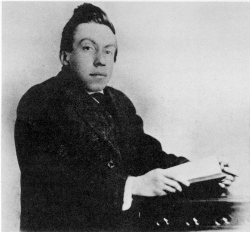Randolph Bourne facts for kids
Quick facts for kids
Randolph Bourne
|
|
|---|---|
 |
|
| Born | May 30, 1886 |
| Died | December 22, 1918 (aged 32) New York City, US
|
| Nationality | American |
| Alma mater | Columbia University |
| Occupation | Writer |
Randolph Silliman Bourne (born May 30, 1886 – died December 22, 1918) was an American writer and thinker. He was known for his progressive ideas during a time of big changes in the United States. Bourne is often seen as a voice for young, radical thinkers during World War I. His articles appeared in important magazines like The New Republic. He is most famous for his essays, especially "The State." In this essay, he wrote the well-known phrase "war is the health of the state." He meant that governments often gain more power and resources when there is a war.
Contents
Early Life and Education
Randolph Bourne faced health challenges from a young age. His face was affected at birth, and at age four, he got tuberculosis of the spine. This illness caused his growth to be stunted and gave him a hunched back. He wrote about these experiences in his essay, "The Handicapped - by one of them." This essay is now seen as an important work in the study of disability.
When he was 23, Bourne won a scholarship to study at Columbia University. He earned his first degree in 1912 and a Master's degree in 1913. He worked as a journalist and editor for the Columbia Monthly magazine. He also wrote for The New Republic from its start in 1914. However, when America joined World War I, the magazine stopped publishing his articles because he was against the war. From 1913 to 1914, he also studied in Europe.
Views on War and Democracy
World War I caused a big disagreement among American progressives. Some, like Bourne and Jane Addams, were against the war. Others, like the philosopher John Dewey, supported it. Bourne had been a student of Dewey's at Columbia. But he disagreed with Dewey's idea that the war could help spread democracy.
In his 1917 essay "Twilight of Idols", Bourne argued that America was using democracy as an excuse for war. He felt that the country wasn't truly examining what democracy meant. He believed Dewey had forgotten his own democratic ideals by focusing only on the appearance of a democratic government.
Ideas on American Culture
Bourne was greatly influenced by an essay called "Democracy Versus the Melting-Pot." This essay was written by Horace Kallen in 1915. Like Kallen, Bourne believed that being "American" should not just mean following Anglo-Saxon traditions.
In his 1916 article "Trans-National America," Bourne argued for a different idea. He said that the United States should welcome and include immigrant cultures. He called this a "cosmopolitan America." He felt that immigrants should not be forced to give up their own cultures and become like the dominant Anglo-Saxon culture.
Bourne believed that people would often keep their native culture and literature, even if they lived in another country. He thought this was true for the many immigrants in the United States. Because of this, Bourne did not think immigrants from different parts of the world would easily become like the Anglo-Saxon traditions. These traditions were often seen as the only "American" ones.
A Vision for a United Nation
Bourne believed that America offered a special chance for freedom and new opportunities. He felt that with its many different cultures and people, America could become a "trans-national nation." This kind of nation would have cultural connections with other countries around the world.
Bourne thought America would grow stronger by accepting immigrants' ways of life. He felt this was better than making everyone fit into a "melting-pot" idea. This broader view would eventually lead to a nation where everyone living in it was united. He believed this unity would help the country become truly great. World War I, which was happening when he wrote this article, greatly influenced these ideas.
Later Life and Legacy
Randolph Bourne died in 1918 from the Spanish flu pandemic. This happened shortly after World War I ended. John Dos Passos, an important American modernist writer, wrote about Bourne in his novel 1919. Dos Passos used many of Bourne's ideas, especially from "War Is The Health of the State," in his own writing.
See also
 In Spanish: Randolph Bourne para niños
In Spanish: Randolph Bourne para niños

